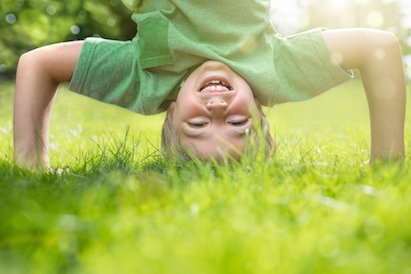 A hit of caffeine from morning coffee or an afternoon energy shot may be OK for adults, but can prove problematic for children.
A hit of caffeine from morning coffee or an afternoon energy shot may be OK for adults, but can prove problematic for children.
What is Caffeine?
You can find caffeine in coffee, soda, ice cream, chocolate, energy drinks, medication and more, but contrary to popular belief, it’s not a nutrient. Instead, it’s a naturally-occurring stimulant that effects our central nervous system — brain, spinal cord and nerves.
In can help us feel more alert, awake and energetic, but too much can cause depressions, restlessness, nausea nutrient absorption deficiency, increased anxiety and sleep problems. Kids have an especially low tolerance for caffeine, which means even small doses can be unhealthy.
In a recent study, kids who consumed the most caffeine also slept the fewest hours. And in a tragic and rare occurrence, a teen died from caffeine overdose earlier this year.
Guidelines
The FDA recommends that adults limit caffeine intake to 400 mg per day, which is roughly four to five cups of coffee. There aren’t any FDA recommendations for kids, but there are a couple other sources that provide good directions. Health Canada recommends that children 12 years old and younger limit caffeine intake to 45-85 mg per day, depending on a variety of other factors. The American Academy of Pediatrics discourages any caffeine consumption.
How Much Caffeine?
- Starbucks Coffee (tall, 12 oz.) = 260 mg
- Starbucks Espresso (solo) = 75 mg
- 5-hour energy shot (2 oz.) = 200 mg, extra strength = 230 mg
- Rock Star (24 oz.) = 240 mg
- Red Bull (8.46 oz.) = 80 mg
- Coca Cola (12oz.) = 34 mg
- Tea (8 oz.) = 48 mg
- Hot chocolate (12 oz.) = 20 mg
- Ben and Jerry’s Ice Cream “Coffee Coffee Buzz Buzz Buzz” (1 cup) = 100 mg
- OTC Tablets (per tablet) = 200 mg
The Bottom Line
If you’re kids aren’t consuming caffeine, then help them keep it that way. If they are, look at ways to cut back and make lifestyle changes to minimize or eliminate caffeine. Recognize that there may be withdrawal symptoms like headaches, drowsiness and irritability, but these will go away as caffeine intake decreases. Less is more when it comes to caffeine.
Search Our Blog
Our Instagram
Recent Posts
- Don’t Use Duct Tape! And Nine Other Car Seat Fails September 19, 2017
- (Most) Kids Don’t Love Homework, Here are 10 Ideas for Parents September 12, 2017
- Preventing Youth Suicide is Possible — What You Need to Know September 8, 2017
- What Do Peanut Allergies Look Like? August 24, 2017
- Separation Anxiety: How to Help Your Child and Yourself August 18, 2017
Our Most Popular Posts
 5 Acupressure Points Every Parent Should Know 49 views
5 Acupressure Points Every Parent Should Know 49 views - Preventing Youth Suicide is Possible — What You Need to Know 44 views
 “We See Hope”: Reflections of Pediatric Cancer Nurse 38 views
“We See Hope”: Reflections of Pediatric Cancer Nurse 38 views - Don’t Use Duct Tape! And Nine Other Car Seat Fails 38 views
 Street Safety: 10 Pedestrian Safety Tips for Kids 28 views
Street Safety: 10 Pedestrian Safety Tips for Kids 28 views - What Do Peanut Allergies Look Like? 10 views
 “We Have Seen Many Miracles . . . ” the Healing Journey for a Baby With Omphalocele 8 views
“We Have Seen Many Miracles . . . ” the Healing Journey for a Baby With Omphalocele 8 views - Rain Falls, Leaves Fall, Humpty Dumpty Falls . . . Kids Shouldn’t 6 views
- Thriving with Celiac Disease: What you Need to Know 5 views
- The Air We Breathe: Protecting Your Kids During an Inversion 3 views
Archives
- September 2017 (3)
- August 2017 (6)
- July 2017 (4)
- June 2017 (4)
- May 2017 (5)
- April 2017 (5)
- March 2017 (3)
- February 2017 (2)
- January 2017 (1)
- December 2016 (3)
- November 2016 (1)
- October 2016 (5)
- September 2016 (4)
- August 2016 (6)
- July 2016 (4)
- June 2016 (4)
- May 2016 (1)
- April 2016 (3)
- March 2016 (5)
- February 2016 (6)
- January 2016 (7)
- December 2015 (5)
- November 2015 (8)
- October 2015 (8)
- September 2015 (2)
- August 2015 (1)
- July 2015 (3)
- June 2015 (2)
- May 2015 (2)
- March 2015 (3)
- February 2015 (2)
- January 2015 (2)
- November 2014 (1)
- October 2014 (1)
- September 2014 (3)
- August 2014 (2)
- July 2014 (4)
- June 2014 (2)
- May 2014 (4)
- April 2014 (6)
- March 2014 (4)
- February 2014 (1)
- September 2013 (1)
- February 2013 (1)
- June 2012 (1)















Add comment